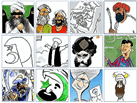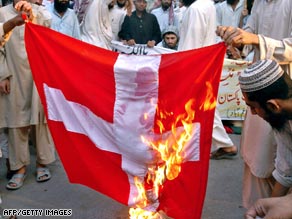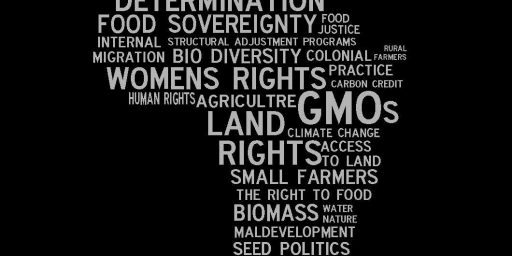Manifesto Against Islamist Totalitarianism
Denmark’s Jyllands-Posten last night published, in English, “MANIFESTO: Together facing the new totalitarianism.” It is an essay signed by twelve international scholars and writers, most notably Salman Rushdie. The Manifesto, in its entirety, is reproduced below:
After having overcome fascism, Nazism, and Stalinism, the world now faces a new totalitarian global threat: Islamism.
We, writers, journalists, intellectuals, call for resistance to religious totalitarianism and for the promotion of freedom, equal opportunity and secular values for all.
The recent events, which occurred after the publication of drawings of Muhammed in European newspapers, have revealed the necessity of the struggle for these universal values. This struggle will not be won by arms, but in the ideological field. It is not a clash of civilisations nor an antagonism of West and East that we are witnessing, but a global struggle that confronts democrats and theocrats.
Like all totalitarianisms, Islamism is nurtured by fears and frustrations. The hate preachers bet on these feelings in order to form battalions destined to impose a liberticidal and unegalitarian world. But we clearly and firmly state: nothing, not even despair, justifies the choice of obscurantism, totalitarianism and hatred. Islamism is a reactionary ideology which kills equality, freedom and secularism wherever it is present. Its success can only lead to a world of domination: man’s domination of woman, the Islamists’ domination of all the others. To counter this, we must assure universal rights to oppressed or discriminated people.
We reject « cultural relativism », which consists in accepting that men and women of Muslim culture should be deprived of the right to equality, freedom and secular values in the name of respect for cultures and traditions. We refuse to renounce our critical spirit out of fear of being accused of “Islamophobia”, an unfortunate concept which confuses criticism of Islam as a religion with stigmatisation of its believers.
We plead for the universality of freedom of expression, so that a critical spirit may be exercised on all continents, against all abuses and all dogmas.
We appeal to democrats and free spirits of all countries that our century should be one of Enlightenment, not of obscurantism.
Paul Belien argues that the Manifesto “misses the point.”
While Islamism can be considered the perversion of religion, the three scourges of the 20th century – Fascism, Nazism (National-Socialism) and Stalinism – were secular ideologies. Neither Adolf Hitler nor Joseph Stalin were theocrats. It takes “French intellectuals” to use mankind’s experience with National-Socialism and Stalinism as motivation for a rallying cry to oppose “religious totalitarianism” and a call for “secular values,” which they hold to be “universal values.”
But the authors do not content that these threats were religious, merely that Islamist ideology is similarly totalitarian. Wikipedia gives a decent enough explanation:
Totalitarianism describes a form of government where the state exercises absolute political and social control over most or all aspects of public and private behavior, there is no regard for individualism, and political opposition is typically subject to violent or arbitrary repression. In political science, especially in comparative politics, the term functions as an ideal type.
A totalitarian regime mobilizes its entire population in support of the state and a political ideology, and does not tolerate activities which are not directed toward the goals of the state, such as involvement with labour movements, religion or opposition political parties. Such regimes maintain political power through a range of measures including the use of secret police, mass surveillance, propaganda disseminated through state-controlled mass media, restriction of a range of rights and freedoms including freedom of speech, and widespread use of terror tactics.
Is there any doubt that Islamist ideology, which believes church and state are one and that any deviation from the true practice of the faith as interpreted by any given mullah must be punished by death, is totalitarian? I think not.
Belien continues,
History in the past century, however, has clearly indicated that those fighting for an “egalitarian” world were the most “liberticidal” of all. Freedom is the right to live “unegalitarianly.” This is why The Brussels Journal defends the right of individuals – though not of the state – to “discriminate” (which, by the way, contrary to what the manifesto implies, is not the same as “oppress”). Indeed, it is no coincidence that the manifesto avoids referring to “Socialism” (and even “Communism”) among the scourges of the past century and prefers to speak of “Nazism” and Stalinism” instead. Half the manifesto’s signatories are probably Socialists, which explains why the manifesto obfuscates the secular, Socialist roots of these scourges.
Perhaps. But socialism, while hardly my preference, is not necessarily totalitarian. Most of Western Europe practices a form of socialism but there is still rather broad freedom of expression, religion, and so forth. That was not the case under Hitler or Stalin or Mao. Even other Communists, such as Yugoslavia’s Tito or the USSR’s Mikhail Gorbachev, allowed a comparatively high degree of personal freedom. Their regimes were more properly authoritarian rather than totalitarian.
Similarly, the authors of the Manifesto make clear that their quarrel is not with Islam or religion per se but with the radical Islamist-Jihadist variant. Indeed, they argue that they are fighting for equality and freedom Muslims living under the yoke of that totalitarianism.
Belien’s conclusion:
The Islamists and the secularists (including the priests and bishops among them) have more in common than the Islamists and the Christians (including the agnostics among them), because the latter acknowledge that at the heart of Christianity is the individual with his individual responsibility before God. Without Christianity, individual responsibility would not have become the centre of European civilization. It was the French Revolution that jeopardized this tradition and that became the root of collectivism, with its socialist, fascist, national-socialist and communist excesses. From this perspective even Jihadism is more a child of secularism than of religion.
Even as an anti-theist, that strikes me as overbroad. Christianity, especially the values that came from the Protestant Reformation, is indeed a cornerstone of Western Civilization. Yes, collectivism is inherently in opposition to individual freedom. It does not follow, though, that Jihadism is secular.
Indeed, it is inconceivable that Jihad and Islam could be considered apart from one another:
The word Jihad (Arabic جهاد ǧihād]) comes from the Arabic root ǧhd, and literally means “to exert utmost effort, to strive, struggle”. This can connote a wide range of meanings: anything from an inward spiritual struggle to attain perfect faith to a political or militant struggle to defend or further Islam.Jihad has become repeatedly used in the context of Holy War by Islamic militants and some religious leaders throughout the Middle East [1].
Some Muslims consider jihad to be the most misunderstood aspect of their religion by non-Muslims [2]. The Islamic religious legitimacy of the goals or methods of various Islamist movements who adopt the terminology of jihad has been questioned, notably by moderate and liberal Muslims.
In much of the world jihad is associated with the phrase “holy war” [3]; however, the concept of jihad encompasses more than just warfare, and a more accurate translation probably would be “holy struggle”, “righteous struggle” or “holy endeavour”. The denotation is of a challenging or difficult, (frequently) opposed effort, made either in accomplishment or resistance. However, as applied by Muhammed during his later years, it usually involved actual armed conflict. The situation is analogous to the Christian term “crusade”, whose usage encompasses any righteous struggle, including those substantially removed from armed conflict, but is associated with “holy war” in much of the Muslim world. Perhaps ironically, many who are quick to insist that one word has non-military meanings are equally quick to insist that the other does not.
Jihad is intertwined with Islamic teachings. For the vast majority of Muslims and even Muslim clerics, the gentler interpretation as an internal struggle is emphasized rather than the violent, expansionist version. As with all ideologies, there are doubtless many non-believers who exploit the fervor of the true believers for their own secular, political ends (see, for example, the Saudi royals). But almost all of the Jihadists themselves, including folks like Osama bin Laden, would be deeply insulted if one dared suggest they were motivated by anything but the most pious religious motives.
Elsewhere: Michelle Malkin has a huge roundup on this topic. Rusty Shackleford headlines the group of bloggers wishing to add their signatures to the Manifesto.
_________

See these cartoons in full size here.
Previous stories on the Danish Muslim cartoons below the fold.
-
Jyllands-Posten Wins Prize for Defense of Free Expression
D.C. Denmark Rally Photos
D.C. Rally for Denmark at Noon (Updated)
D.C. Rally for Denmark on Friday
Cartoon Violence Pits Muslim Against Muslim
Censorship by the Muslim Mob
Nigerian Christians Riot, Kill Muslims in Retaliation
Iran Supports End to Cartoon Violence
Muslim Cartoon Rage Latest Example of Religious Virus
Why He Published Those Cartoons
Nigeria Cartoon Riot Kills at Least 15
Cleric Offers Million Dollar Bounty for Murder of Cartoonist
Bama Riots Over Bear Bryant Cartoons
The Islamists’ War on the Internet
Pakistan Rioters Burn KFC, Pizza Hut, and McDonald’s
Cartoons as Emotional Torture and Intellectual Terrorism (Leopold Stotch)
Moderate Muslims Speak Out (Leopold Stotch)
Danish Muslim Cartoons: Blogger Hypocrisy?
Egypt Published Danish Cartoons During Ramadan
Danish Cartoons & Abu Ghraib Photos (Leopold Stotch)
Hypocrites? (Steve Verdon)
Danish Muslim Cartoons: What Would Mohammad Do?
Iranian Paper Launches Holocaust Cartoon Competition
Danish Muslim Cartoon Protests Kill Six
Dutch Muslim Cartoon: Anne Frank and Hitler in Bed
Danish Muslim Cartoon Controversy in Context
Danish Embassy in Syria Torched over Muslim Cartoons
Danish Muslim Cartoons ‘Offensive,’ Says U.S. Government
Muslim Day of Anger to Respond to Cartoons
French Editor Fired Over Muhammad Drawings
French and German Papers Republish Danish Cartoons
Danish Newspaper Apologizes for Muslim Cartoons





That comes pretty close to describing conservative rule in America. Not exact, but pretty close.
Ken,
Your TrackBacks look so funny. I doubt they can be any smaller font.
Compared to the list of your post directly above they look like a spec of dust.
Nothing a little aluminum foil helmet won’t combat, Ken. Keep fighting the good fight, man.
Ken as usual ias embarked on another one of his many trips out there, somewhere, only the good lord knows. It’s for sure Ken doesn’t know.
Kens world consists of a great imagination of repression brought on by his depreddion over the loss of the 2000 and 2004 elections.
If anyone out here knows Ken, Get the rubber room and the guys in the white jackets ready for 2008, he will be a totally lost soul after losing then also.
Poor, Poor, Ken.
Hey, go easy Ken. He’s upset, and understandably so. We all know if there’s any group in America opposed to statism, it’s people like Ken.